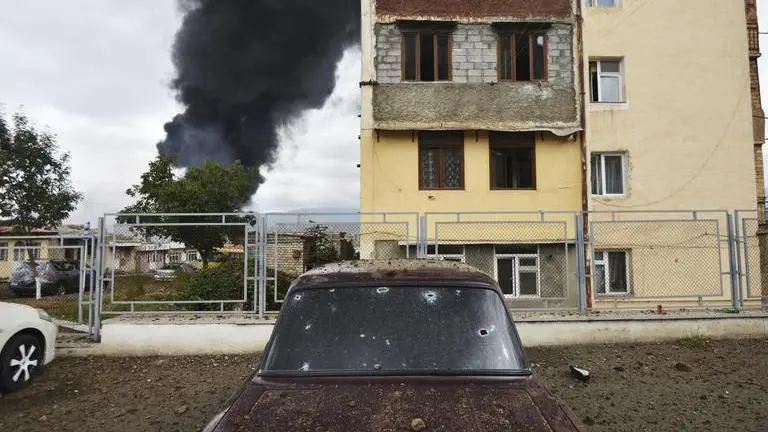Updated 28 November 2020 at 22:20 IST
Ganja left devastated after Nagorno-Karabakh conflict
There were at least 17 dead and scores wounded in Muhtar Haciyev street in Ganja by the morning of October 17.
- World News
- 3 min read

There were at least 17 dead and scores wounded in Muhtar Haciyev street in Ganja by the morning of October 17.
Azerbaijan's second biggest city was shaken by what Azerbaijani officials described as missile attacks that night, amidst the bloody conflict over Nagorno-Karabakh.
Artur Mayakov, 13, was fatally wounded that day. He was rushed to a hospital where he was able to cling to life for nine days only to succumb to his wounds.
Artur was born in Russia in 2007 but lost his father before he was born. His mother called his grandmother and his aunt Saire Kuliyeva, who live in Azerbaijan, to take custody of Artur or put him up for adoption. The family took him in and he had been living in Muhtar Haciyev street ever since.
Advertisement
Kuliyeva spoke to the Associated Press in front of the ruins of her old house and recounted her loss: "Artur was a very beautiful, very benevolent, very talented boy filled with love of life."
"What did these people do wrong? Why did the entire world, the European Union and other powerful states turn a blind eye (to what happened here)?" Kuliyeva added, in tears.
Advertisement
Azerbaijani officials said the Soviet-made Scud missile destroyed or damaged 20 residential buildings in Ganja overnight, and emergency workers spent hours searching in the rubble for victims and survivors.
Scud missiles date back to the 1960s and carry a big load of explosives but are known for their lack of precision.
In a televised address to the nation, Azerbaijan's president, Ilham Aliyev, denounced the missile strike as a war crime and warned the leadership of Armenia that it would face responsibility.
Armenian Defense Ministry however, denied launching the strike, but the separatist authorities in Nagorno-Karabakh put out a statement listing alleged "legitimate" military facilities in the city of Ganja, although they stopped short of claiming responsibility for the attack.
Tahzegul Sahnazarova lost her son, grandson and daughter-in-law in the attack.
Sahnazarova walked amongst the ruins of her old apartment, now adorned with wreaths and shrines to those who were killed in the strike.
Sahnazarova said that she and a small child were the only ones left from their family after the attack.
Nagorno-Karabakh lies within Azerbaijan but has been under the control of ethnic Armenian forces backed by Armenia since 1994. That war left Nagorno-Karabakh itself and substantial surrounding territory in Armenian hands.
Heavy fighting that erupted in late September marked the biggest escalation of a long-simmering conflict between the two ex-Soviet nations.
The violence was halted by a Russian-brokered truce two weeks ago. The agreement stipulated that Armenia hand over control to Azerbaijan of some areas it holds outside Nagorno-Karabakh's borders and was celebrated in Baku as a major victory.
Two out of three territories mentioned in the agreement have already been handed over to Azerbaijan.
(Image Credit: AP)
Published By : Associated Press Television News
Published On: 28 November 2020 at 22:20 IST
